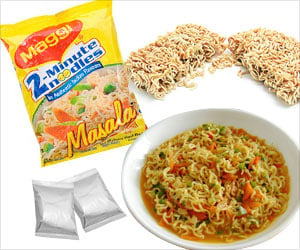Frequent noodle consumption can lead to nutritional deficiencies, weight gain, and serious health issues like diabetes and hypertension.
- High refined carbs in noodles can spike blood sugar levels, increasing diabetes risk
- Instant noodles lack essential nutrients, leading to poor overall health
- Excess sodium in noodles raises the risk of high blood pressure and heart disease
Noodles are High in Refined Carbohydrates
Most noodles are made from refined flour, which undergoes significant processing that strips away essential nutrients like minerals and fiber. This results in a product that is primarily composed of refined carbohydrates. Consuming high amounts of refined carbs can cause rapid spikes in blood sugar levels (1✔ ✔Trusted SourceNoodles Made from High Amylose Wheat Flour Attenuate Postprandial Glycaemia in Healthy Adults
Go to source). Over time, these spikes can lead to insulin resistance, a condition that significantly raises the risk of developing type 2 diabetes and other metabolic disorders.
Refined carbs also lack the satiety provided by whole grains and fiber-rich foods, leading to increased hunger and higher calorie intake. This can create a vicious cycle of overeating and energy crashes, making it harder to maintain a balanced diet and healthy weight.
Instant Noodles Have Low Nutritional Value
Instant noodles, a popular variety of noodles, are particularly notorious for their low nutritional value. They often lack critical nutrients such as vitamins, minerals, and fiber. Relying on instant noodles as a primary food source can result in severe nutritional deficiencies and poor overall health (2✔ ✔Trusted SourceInstant noodles: processing, quality, and nutritional aspects
Go to source).
For example, essential vitamins like A, C, and various B vitamins are often minimal or entirely absent in instant noodles. These vitamins play crucial roles in maintaining immune function, skin health, and energy metabolism. Similarly, the lack of dietary fiber in noodles can lead to digestive issues, such as constipation, and may increase the risk of developing colon cancer.
Processed Noddle Seasonings Have a High Salt Concentration
One of the most concerning aspects of instant noodles is their high sodium content. The seasoning packets included with these noodles are often loaded with salt, which enhances flavor but poses significant health risks (3✔ ✔Trusted SourceSalt content of instant noodles in Malaysia: a cross-sectional study
Go to source). Consuming excessive amounts of sodium can lead to high blood pressure (hypertension), a major risk factor for heart disease and stroke.
Additionally, high sodium intake is associated with kidney problems, as the kidneys have to work harder to filter out the excess salt from the body. Over time, this can lead to chronic kidney disease. For individuals who are already prone to hypertension or have a family history of heart disease, regularly consuming high-sodium foods like noodles can exacerbate these conditions.
Instant Noodles are Loaded With Additives and Preservatives
Processed noodles typically contain various additives, preservatives, and artificial flavors designed to improve taste and extend shelf life. While these chemicals help maintain the product's appeal and convenience, their long-term health effects are concerning.For instance, many instant noodles contain monosodium glutamate (MSG), a flavor enhancer that has been linked to headaches and other adverse reactions in sensitive individuals (4✔ ✔Trusted Source
A review of the alleged health hazards of monosodium glutamate
Go to source). Other preservatives and additives can disrupt gut health by altering the balance of beneficial bacteria, potentially leading to digestive issues and weakened immunity.
Consuming these substances regularly can also contribute to a build-up of toxins in the body, increasing the risk of chronic diseases and negatively impacting overall health. It’s important to be aware of these hidden ingredients and their potential long-term effects.
Processed Noodles are Responsible for Weight Gain
Noodles can be deceptively high in calories, especially when consumed in large portions or combined with calorie-dense toppings and sauces. Their lack of protein and fiber means they are not particularly filling, which can lead to overeating.When eaten frequently and in significant amounts, the high calorie content of noodles can contribute to weight gain and obesity (5✔ ✔Trusted Source
Instant noodle consumption is associated with cardiometabolic risk factors among college students in Seoul
Go to source). This is particularly problematic given the high carbohydrate content, which, when consumed in excess, is stored as fat in the body. Obesity is a major risk factor for numerous health conditions, including heart disease, diabetes, and certain cancers.
Additionally, the convenience and addictive taste of instant noodles can make them a go-to meal, reinforcing unhealthy eating habits and making it harder to incorporate more nutritious options into the diet.
While noodles can be a tasty and convenient meal option, consuming them daily is not advisable due to their high refined carbohydrate content, low nutritional value, high sodium levels, presence of additives and preservatives, and potential to contribute to weight gain. For better health outcomes, it's important to limit noodle consumption and opt for more nutritious, whole-food alternatives. Incorporating a variety of fruits, vegetables, whole grains, and lean proteins into your diet will provide the essential nutrients your body needs to function optimally and help prevent the chronic diseases associated with a high intake of refined and processed foods.
References:
- Noodles Made from High Amylose Wheat Flour Attenuate Postprandial Glycaemia in Healthy Adults - (https://pubmed.ncbi.nlm.nih.gov/32707905/)
- Instant noodles: processing, quality, and nutritional aspects - (https://pubmed.ncbi.nlm.nih.gov/24564594/)
- Salt content of instant noodles in Malaysia: a cross-sectional study - (https://pubmed.ncbi.nlm.nih.gov/31048428/)
- A review of the alleged health hazards of monosodium glutamate - (https://pubmed.ncbi.nlm.nih.gov/31920467/)
- Instant noodle consumption is associated with cardiometabolic risk factors among college students in Seoul - (https://pubmed.ncbi.nlm.nih.gov/28584580/)
Source-Medindia











